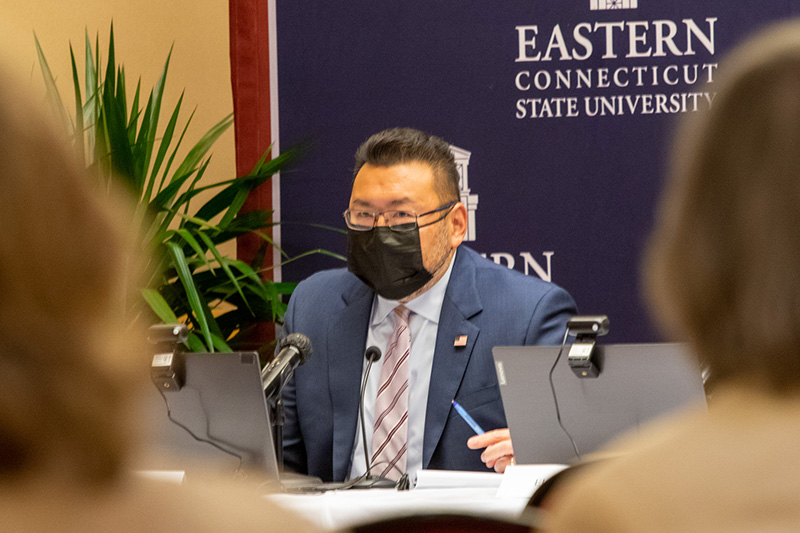- Apply
- Visit
- Request Info
- Give



Published on December 13, 2021

Terrence Cheng, president of the Connecticut State Colleges and Universities (CSCU) system, came to Eastern Connecticut State University on Dec. 2 for a series of meetings with campus stakeholders. The five groups he met with included students, faculty, staff, executive administrators and members of the ECSU Foundation Board of Directors.
Cheng began his presidency in July 2021, immediately engaging such issues as COVID-19, budgets, enrollments and shared services. Prior to joining the CSCU, Cheng served as campus director of the University of Connecticut’s Stamford campus.
“His goal — and mine — is to work together to improve academic programs and services for our students,” said Eastern President Elsa Núñez. She pointed out that Cheng is a first-generation college graduate and “understands our mission and values.”
“I see myself in so many of the students we serve across this system,” said Cheng. “It is my life’s honor to take on this responsibility as CSCU president.”
Cheng mentioned several of the challenges facing the CSCU system, including managing the ongoing pandemic, budget cuts, enrollment shortages and a wave of upcoming retirements. To the issue of enrollment, he said, “This is not a Connecticut problem; this is a national problem.”

He noted that year after year, Eastern matches or exceeds the retention rates of the system, and also has the system’s highest graduation rate.
To the issue of budgets, he said, “We’re not going to cut or save our way out,” asserting that the answer is more investment from the state.
He went on to praise Eastern for its healthy reserve. “President Núñez deserves a lot of credit,” he said. “This is the type of work you don’t see but takes years and years to build.”
Regarding his goals for the system, Cheng wants to focus on “aligning academic programs with the needs of the 21st century.” And he emphasized using data to drive decisions and consensus, as well as to candidly reflect on performance.
Cheng says that the CSCU doesn’t have control over demographics, workforce needs or competition among the higher education landscape, but that institutions within the CSCU can control their value proposition and programming/curriculum, fundraising and industry/community partnerships.
When asked about campus identity and how the CSCU central office plans to govern the system’s 17 colleges and universities, Cheng said, “The purpose of a system is to establish processes, procedures and protocols for the efficiency of the campuses… to establish standards and guidelines, but also allow for flexibility and latitude among the individual campuses.”
Written by Michael Rouleau